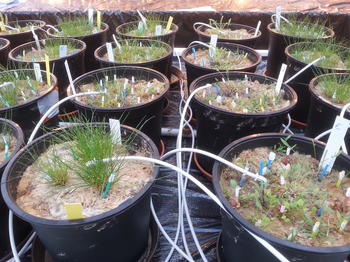Climate Change on Fast-forward
Greenhouse experiments allow scientists to study the effects of soil fungi and other environmental factors on plant communities.
Image Credit: Matthias Rillig
Biologists from Freie Universität Berlin use fungi to study the effects of global warming.
News from Dec 15, 2016
Climate change is in full swing, but how do flora and fauna respond to it? Are there only losers, or do some species actually benefit? And how do certain species manage to adapt? Biologists all over the world are engaged in lab experiments to find out. But how realistic are they?
“The parameters used in the lab are changed to simulate future environmental conditions, but the change is generally dramatic and very fast. Global warming, though, and the increase in carbon dioxide concentrations in the atmosphere, elevated nitrogen input and ocean acidification – all of that takes place very, very slowly,” says Matthias Rillig, a professor of plant ecology at Freie Universität Berlin.
He is interested in what happens when environmental factors change gradually and on a fluid basis. What Rillig wants to know is whether nature is able to adapt to slow processes of change, and if so, how. Through microevolution or other mechanisms? The European Research Council (ERC) just recently approved a grant of 2.4 million euros for Rillig to find answers to these questions.
The whole article can be found following this link.

